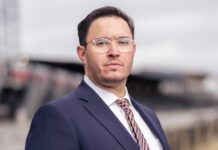
A world-renowned expert on antisemitism and the grave danger it presents, Deborah Lipstadt has been on the front lines of the battle to combat bigotry toward Jews for decades. It was therefore no surprise when she was nominated to be the U.S. Department of State’s Special Envoy to Monitor and Combat Antisemitism, and her 2022 confirmation by the U.S. Senate conferred upon her the title of “Ambassador.” A Holocaust scholar and award-winning author, Lipstadt was well-equipped to take on this new role, which thrust her into the spotlight at a time when antisemitism was rising both in the U.S. and internationally.
Lipstadt recently held a roundtable with several journalists from Jewish media outlets, and the Baltimore Jewish Times was present at the discussion, which took place at the State Department. With anti-Israel views and antisemitism becoming prevalent on college campuses and in cities around the world, it was an opportune time to discuss these vital issues with a diplomat whose primary responsibility is countering that hate.
After having spent time in Europe over the past several months, including Rome, Paris and Germany, Lipstadt was struck by how much the local and state authorities were interested in meeting with her, which she said indicates “that they take this [antisemitism] very seriously.”
Referring to the current situation, particularly since Oct. 7, Lipstadt said, “It’s certainly a threat to the well-being of Jews. … There are places where Jews are feeling increasingly uncomfortable, and often with good reason. … But I also think it’s a real threat to democratic values, to national stability and potentially even national security. … I’ve been working on this [the issue of antisemitism] for over 30 years and it feels different.
“It’s quite clear that we’re seeing a rise of antisemitism worldwide, including in this country,” she said.
At several points during her career, Lipstadt stated that antisemitism at those particular moments was worse than she had ever seen before. As an example, she cited the 2018 massacre at Tree of Life Synagogue in Pittsburgh, calling it “a shock of immense proportions,” and noting that the open use of violence was extremely striking. Regarding the extent of the antisemitism that is currently being seen at some of the Israel-related protests in the U.S. and abroad, she said, “there is a comfort in saying things that people might have thought before, but now feel free to say,” adding that there is “a vileness that we haven’t really seen before.” The feelings of distinctiveness pertaining to the current situation appears to be widespread, with Lipstadt saying that “every one of the countries I’ve visited, and the others that I’ve spoken with, with government officials, colleagues and embassies, acknowledged that it feels different.”
The JT asked Lipstadt about the need to view antisemitism not just as a Jewish problem, but as a global problem, and the importance of communicating that message to people.
“I think it’s important for policy makers, government officials, NGOs, leaders, communal leaders and all of society to recognize that this has broader and deeper implications than an attack on one group. … I think that’s very important for governments to understand. And in my conversations with colleagues in the State Department and the White House and others, that’s the point I’ve been making. I think people are listening,” she said.
Lipstadt, who in a recent CNN interview declared that antisemitism should be condemned on its own, addressed the concern some people have about lumping antisemitism with other forms of hate, such as Islamophobia.
“One of my messages has been that you can’t fight prejudice in silos, you can’t fight hate in silos,” she said. “Some people like to say what begins with the Jews then ends with the Jews. And I think that’s often the case, that when there’s a toxic atmosphere in society it spreads toxicity and spreads like fumes in a storm.
“When you see an act of discrimination and prejudice, call it out for what it is. Then you can place it in a broader context,” she added. “On some level, antisemitism is a prejudice like other prejudices … but it has certain unique elements.”
Lipstadt was asked about recent comments made by Jonathan Greenblatt of the Anti-Defamation League, who said that current events “clarified and confirmed that fanatical anti-Zionism from the hard left is as dangerous to the Jewish community as rabid white supremacy from the extreme right. These are both radical movements. They don’t advocate for a two-state solution, or even a one-state solution. They want a final solution.” Her response to Greenblatt’s remarks focused not so much on Israel, but on antisemitism in a general sense.
“I have friends on the left who were very good at spotting antisemitism on the right. And legitimately so. What they saw was right and their analysis was right. And then I had friends on the right who were very good at spotting [antisemitism] on the left, and they were right, but they never saw it standing next to them. And that really bothered me because I felt that whether consciously or not, that’s a political weaponization of antisemitism. If you can’t see it in your proximity, coming from people with whom you might agree with on many other things, but you only see on the other side of the political spectrum, then I wonder if you’re really interested in fighting it, or are you only interested in using it as a political weapon.”
A question was posed to Lipstadt about Elon Musk, the owner of X (formerly known as Twitter), who recently posted an endorsement of the great replacement theory, which is widely viewed as a white supremacist conspiracy principle.
Lipstadt said Musk’s actions were “irresponsible.” After describing the replacement theory’s history and referring to it as “a very old theory,” Lipstadt said, “To see it go mainstream that way was really disturbing. It was retracted, but the damage was done.
“When those kinds of things are repeated, it gives them an imprimatur of gravitas that they wouldn’t otherwise have. And people repeat them, even though many people were appalled by it.”
One of the topics of conversation was the issue of anti-Zionism and when that might cross the line and become antisemitism.
“I do think that one has to be careful about mixing up criticism of Israeli policy and antisemitism so you don’t give fodder to those who say, oh, anytime you criticize Israel, you call me an antisemite,” Lipstadt said.
Citing the protests in Israel pertaining to the judicial reform proposals that were taking place right up until the Oct. 7 attacks, Lipstadt noted that they “were highly critical, so I think it’s really important to make the separation.”
That being said, she pointed to some of what has been happening since Oct. 7, with people overlooking Hamas’ atrocities or denying that they happened. She also referenced the videos we have seen of people tearing down the kidnapped posters that have become a symbol of solidarity with the hostages taken by Hamas, questioning “the glee with which some people tear them down … it’s kind of shocking.”
Lipstadt said much of the distinction between anti-Zionism and antisemitism is dependent on a person’s motivation. When asked how one would know when an act is motivated by anti-Jewish hatred, Lipstadt acknowledged that sometimes you don’t. She went on to cite Jacobellis v. Ohio, a case that was decided by the U.S. Supreme Court in 1964. At issue was whether the state of Ohio could prohibit a movie that featured an explicit love scene from being shown in light of the First Amendment. The court ruled that the movie was not deemed obscene. Lipstadt referred to Justice Potter Stewart’s famous statement about what is considered pornography: “I know it when I see it, and the motion picture involved in this case is not that.” Lipstadt said we can do better than that but conceded that there are times when it calls for the “I know it when I see it” approach.
The issue of antisemitism on college campuses was another big topic of conversation in light of the disturbing reports that we have seen emanating from universities across the U.S. following the Oct. 7 Hamas attacks in Israel.
“Most of the students on campus are just going to their classes and are not involved in the protests and not involved in the attacks,” she said. “But we’ve seen enough examples on different campuses where pro-Palestinian, pro-Hamas, pro-Gaza demonstrations impact Jews directly.”
Lipstadt spoke about stories she’s heard about Jewish students on campus who have taken the mezuzah off their door or cut back on the overtly Jewish activities they take part in on campus, which she called disturbing. She also talked about her recent trip to Berlin, where she met with Jewish students who described real concern and a sense of fear for their physical safety.
After Lipstadt discussed some of the antisemitic acts that are taking place in the Netherlands and Paris, JT noted some of the brazen antisemitic attacks that have been seen in New York City and elsewhere, where Jews were harassed in broad daylight and in public spaces, and asked her what has changed over the last several years to make those types of incidents more common than they may have been in the past.
“I think one of the things that changed is people feel freer to say these things,” she responded. “As I said, the lid is off – ‘it’s OK.’ ‘It’s OK’ to be walking down Madison Avenue and see a kid with a yarmulke and knock the yarmulke off, things like that. I think there’s a different atmosphere. … I think that it doesn’t just go for antisemitism. I think that across the board there’s a feeling in the United States and worldwide that certain things can be said that couldn’t be said before.”
Lipstadt noted that when people try to justify the Oct. 7 Hamas attacks by pointing to the various challenges that the Palestinians in Gaza or the West Bank face, it leaves her disquieted. She said that in many of these attempts at justification there’s a failure to recognize that there was a strong antisemitic theme expressed in the attacks. “Nothing justifies rape of young children. Nothing justifies killing parents in front of children, and children in front of parents. Nothing justifies taking civilians hostage,” she said.
As someone who has a great deal of experience addressing Holocaust denial, Lipstadt was asked about those who deny the Oct. 7 Hamas attacks.
“I was struck by the speed and the intensity with which the denial of the atrocities [began], even when coming from Hamas itself. It makes as little sense as Holocaust denial and Holocaust denial makes no sense.”
Lipstadt said she has found that the most potent arguments against Holocaust denial is Nazi evidence, including German army reports, German government reports and statements by Germans. In terms of the Oct. 7 attacks, she said that using Hamas’ own footage makes it harder to deny that the atrocities took place.
“The speed of the rewriting of history or of current contemporary events is awesome in the worst kind of way and is worrisome in an even worse way. Because if history can be rewritten so quickly, nothing is really safe in that sense … qualitatively this feels different,” she added.
The JT asked Lipstadt about the videos of Hamas’ barbarism that the Israeli government has aired for journalists, which document some of the horrific acts that took place on Oct. 7.
“I haven’t seen it … I don’t think I could … The reports that I’ve read have been so devastating in their cruelty and so devastating in their utter lack of humanity, in their glee,” she responded. “I’m just suggesting that there was a glee here … the rapes, the torture of children, burning people alive.”
With antisemitism spiking across the globe, there is no question that Lipstadt has her work cut out for her. Nevertheless, by virtue of her experience and willingness to confront antisemitism whenever and wherever it rears its ugly head, Lipstadt is the perfect person to tackle it and act to quell the wave of antisemitism that has washed over the world.







